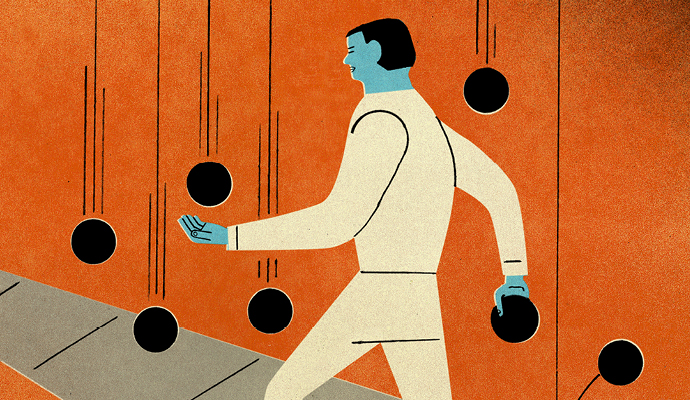No Person Left Behind
What can be done when business and society marginalize those with cognitive decline?
Recently, the New York Times published a short opinion article by Wendy Mitchell, titled “I Had Alzheimer’s. But I Wasn’t Ready to Retire.” At age 58, after more than 20 years as an administrator for the British National Health Service (“a job I loved”), she realized she could no longer manage the tasks that had once been second nature to her. Mitchell held onto her job for eight months after telling her boss about her diagnosis, dependent on her teammates, who left sticky notes to remind her of critical tasks. Her article is a plea for employers everywhere to take similar measures for hundreds of thousands of other employees with cognitive decline. She laments that her boss never sent the message she longed to hear and felt she deserved: “Wendy, you have always been an asset to my department. Now it’s my turn to help you.”
In all the discussion about the inequities of our current economy and the need for business to play a stronger role, it is rare to hear suggestions this specific and powerful: Take responsibility for the well-being of employees whose performance declines. Yet I doubt very many business leaders will follow it, for it contradicts a core concept, typically unspoken but implicit in the actions of every high-performing enterprise. People’s intrinsic value must be tied to their productivity — or an enterprise cannot survive.
The intrinsic worth of human beings is a difficult topic to write about. Most of us share a deeply held belief that all people are worth something significant, simply by virtue of being human. Everyone has something to contribute. This is core to both religious and humanist traditions. Few people would want to inhabit a world like Westeros in “Game of Thrones,” where the value of every individual isn’t widely appreciated and life is often cheap.
But consider the subtle dilemma this creates in everyday business practice. When a business must seek competitive advantage to survive, it depends on increasingly high performance. It must weed out low performers. Indeed, that’s the implicit meaning of the common phrase, “Our employees are our greatest asset.” Only those who remain assets can be rewarded as employees.
I am not arguing that companies should give up this utilitarian concept of human capital. It is fundamental to business success. But I think the challenge this approach poses should be more openly discussed, particularly by leaders and management experts. If we want business to be accepted and trusted by society at large, then we need to recognize the limits of a high-performance enterprise, and think seriously about how to compensate.
As an example of the problem, let’s look more closely at early cognitive decline. The Alzheimer’s Association estimates that 15 to 20 percent of people over age 65 have some mild form of this condition, with symptoms such as diminished memory and thinking skills. It can afflict much younger people, too; the first recorded patient of Dr. Alois Alzheimer, who gave his name to the disease, started to show symptoms at age 46. Studies of psychological tests have found that, on average, memory and cognition loss accelerate after age 50. Some significant group of people is thus steadily losing performance acuity during their working lives. (Mitchell gathered statistics from the Alzheimer’s Society in the U.K. and the Mayo Clinic in the U.S. that estimate 240,000 people in those two countries alone fit this category.)
Many people with cognitive decline can hide their symptoms for some time. They may not even realize themselves that it’s happening. Nor may their coworkers, especially in a high-pressure company where people are too busy to monitor each other closely. But bit by bit, the employee might slip behind; foregoing promotions, quietly postponing opportunities to learn new skills, trying to compensate by being pleasant, pretending that there is no problem. Then might come a time when the inability to handle a basic job is noticeable, and the company lays that person off. Not to do so would be profoundly unfair to everyone else. But once outside the safety net of the enterprise, there may be few other places for that individual to go.
The problem is not that the company is shirking its obligation to these individuals. It likely has no legal or contractual obligation to them, even if some might say, as Mitchell suggests, that it has a moral obligation. And if it’s a high-performance organization, an engine of prosperity with financial obligations to shareholders and a mission of creating wealth, it can’t in good conscience assume the burden of any ongoing obligation.
But that doesn’t lessen the loss of dignity, respect, and validation. In most societies, the worth of a human being is tied up with his or her ability to make a contribution: to do something valuable and be recognized and rewarded for it. This contribution doesn’t have to meet the performance standards of, say, a hard-charging MBA; but it has to be solid and it has to be his or her own. That’s why “make-work” jobs and sinecures are derided and deadly. Wendy Mitchell emphasized this point in her New York Times article when she mentioned her wish “to communicate all that we [Alzheimer’s] patients still have to contribute to society.”
If the problem were just about people in cognitive decline, it might be possible to fund and develop a program-style solution. They’re a relatively small group. But there are much larger groups of people in the world today who have also been marginalized in some way: Laid-off factory employees whose skills have become obsolete, immigrants and refugees, people in communities with economic or social challenges, individuals who struggle with “invisible” health issues such as depression or PTSD — the list is endless. They are not given the chance to make the contribution they feel they can.
Though people disagree about the relative attention that needs to be paid to these categories, I think everyone can agree that this problem has political implications. When certain groups are systematically undervalued, respect and recognition become scarce resources. People fight over them. They suspect others of being favored unfairly. They lose their trust in larger systems: in employers, healthcare, banks, government, media, and schools. Ironically, this can all happen — as it is now happening — at a moment of economic growth and significant labor shortages. (There were 6.7 million jobs open in the U.S. at the end of June). All of these less tangible issues help explain why it is so difficult to build trust in society’s institutions, even when they are delivering material benefits to a growing number of people.
Until we business leaders — and community leaders — can more openly discuss these knotty issues about intrinsic human value and who deserves to be valued, we may not be able to design satisfactory solutions to problems such as income inequality. For example, the concept of a universal basic income — essentially, a payment for being a human — has gained attention as a possible antidote to the displacement of human labor by machines. Financial support might seem like a practical solution, but it is not the same as the dignity that comes from a job with recognized value.
Even if there were the will, no single business, or government for that matter, could address this need for dignity and context at the scale that is required. For at the heart of the problem is a societal attitude shift. Historically, people who were undervalued were taken care of by their families or communities — or forgotten. Then business and government picked up the slack. Now they are no longer as capable of filling that role, especially when it comes to providing the intangibles, like respect and an opportunity to contribute. Are we prepared to create new ways to provide those intangibles, or are we willing to forget about hundreds of thousands of undervalued people in an increasingly fragmented global environment?
Are we willing to forget about hundreds of thousands of undervalued people in an increasingly fragmented global environment?
Maybe the answer lies in creating new types of opportunities. Maybe the “gig economy” will provide some of this, but not without more entrepreneurial infrastructure: more ways for marginalized people to create value, link with those who need their contribution, and manage the friction of commercial interaction. Maybe more companies will find ways to create meaningful livelihoods for a small number of people — sponsoring groups of marginalized people in innovative enterprises. Maybe, in some remarkable Internet-enabled, invisible-hand fashion, it will all take care of itself.
Whatever the solution, it has to transcend a perception that I think is broadly held but rarely voiced: that 20 percent of humanity creates 80 percent of its value. It has to help people find the productivity that exists within them. There are millions of people waiting for the right context. And if we can’t create it, we may need to recalibrate the deeply held view that all human beings deserve a certain amount of dignity. Because there may not be enough dignity to go around.






